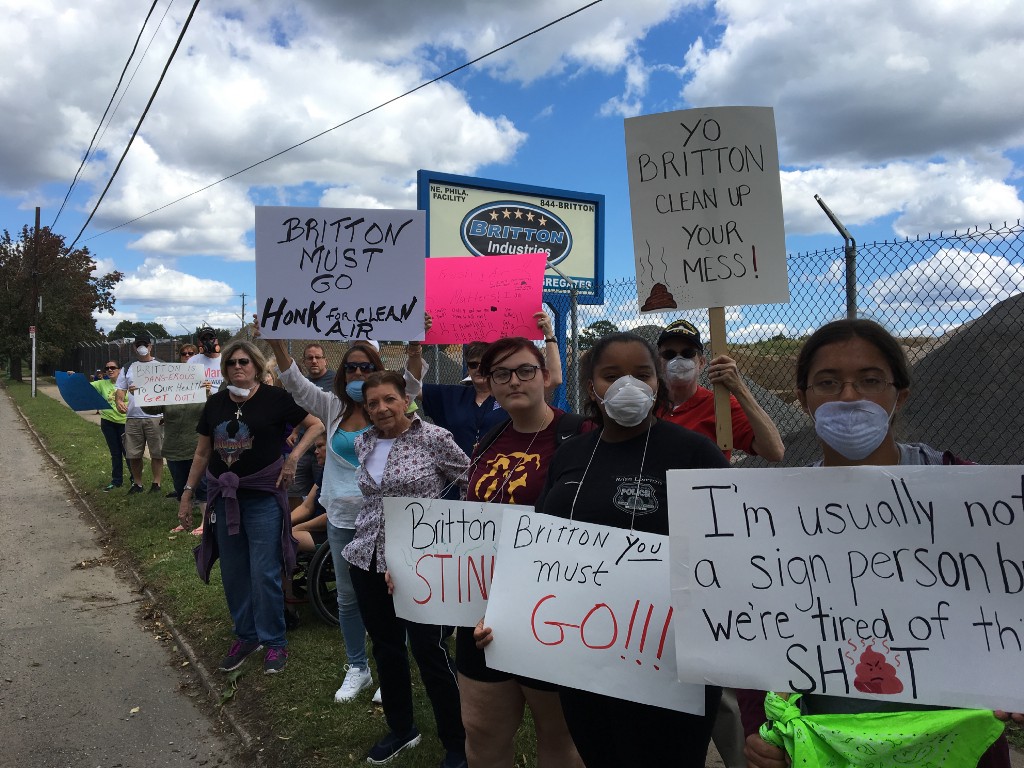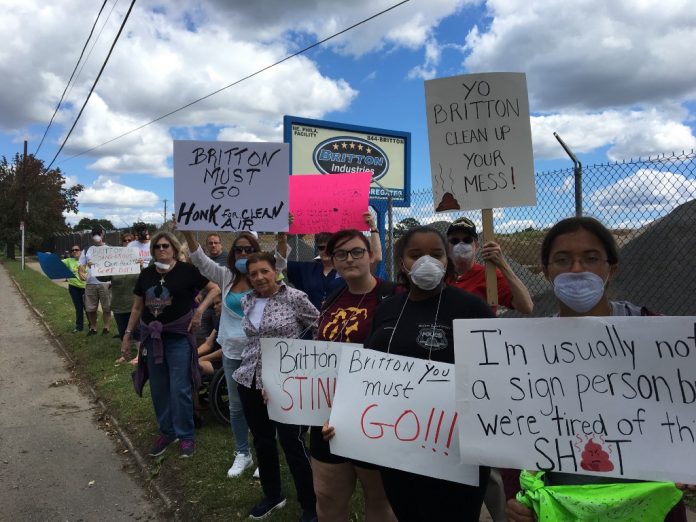Local residents want to know how and why a byproduct of city sewage is polluting their air.

More than 50 Upper Holmesburg residents picketed outside a local topsoil and mulch production facility on Saturday to protest what can politely be described as a huge pile of manure.
But folks who have been forced to inhale a foul odor emanating from the 13-acre Britton Industries site at 8837/8901 Torresdale Ave. at least since early August prefer a certain four-letter word to describe what they’re smelling. And to top off their frustration and anger, they contend that the source of the foul material is none other than the Philadelphia Water Department.
They want to know how and why a branch of city government would pollute the air of its own residential neighborhood. And they want the pollution to stop.
Another branch of city government, the Health Department’s Air Management Services division, has cited Britton repeatedly for air quality violations in recent weeks, according to a department spokesman, after citing the company at least a dozen times for apparently unrelated violations between December 2015 and May 2016.
As previously reported in the Northeast Times, the city fined Britton $12,000 for the earlier violations. Health Department and Britton officials are in discussions about new sanctions the company may face, Health Department spokesman James Garrow said.
Meanwhile, the water department denies responsibility for delivering or conveying odorous materials to the Britton site, according to a spokesman for the mayor’s office. Yet, the water department readily admits the material that likely triggered the smell is a product of the solid waste filtered from the city’s sewer water.
“People are getting sick. It’s all breathing related,” said Jacqueline Knoedler, a Carwithan Street resident who organized Saturday’s public demonstration. “I have actually vomited a few times. And we have to have our central air on all day every day. I’ll go outside in the morning on the deck to have my coffee, at like 6:30. And when it starts to smell, I’m back inside.”
Knoedler lives about two blocks from the Britton site. Another witness told the Times he’s smelled sewage-like odors at Ashburner Street and Frankford Avenue. That’s about seven-tenths of a mile from Britton. Others said they’ve detected the odor in the Pleasant Hill section of Torresdale and while traveling on Interstate 95 through the area. The odor seems to travel whichever way the wind blows on a given day.
Neighbors demonstrated for about two hours on the sidewalk outside Britton’s fenced-in yard where the company recycles and processes construction and landscaping waste into mounds of refined soils, mulch and stone aggregates. Many protesters wore dust masks over their faces, while one man wore a full-blown gas mask. Demonstrators waved handwritten signs with the slogans “Britton must go,” “Honk for clean air,” “Clean up your mess” and “Fresh air matters.”
One sign declared: “I’m usually not a sign person, but we’re tired of this (expletive).” Another stated: “Britton is dangerous to our health. Get out!”
The Times called Britton’s Lawrenceville, New Jersey, headquarters twice on Monday. Two different employees said the company had no comment on the complaints.
Stan Cywinski, president of the Upper Holmesburg Civic Association, said that leaders of his organization have met twice with Britton officials to discuss the complaints: once about 18 months ago and again in recent weeks.
“This thing has been going on for two years now,” Cywinski said. “We’ve had multiple meetings with them and they’ve made some promises. In the first meeting, we asked them if they were taking sludge. And they said they ‘turn the trucks around’ when they come. I don’t know why (sludge trucks) would even come here without a contract.”
The second face-to-face involved one of the civic association’s board members who walked the site with a Britton manager, Cywinski said.
“The guy said they ‘accidentally’ dropped a pile of sludge” last November, Cywinski said. “They told her they won’t be accepting any more sludge. Sludge is human waste from the water department.”
City Councilman Bobby Henon, whose district includes the Britton site, has also met with company officials, including a man the councilman identified as Jim Britton.
“I met the owner on site. He assured me they are taking measures to mitigate the smell and not receive any material that’s going to cause the smell,” Henon said.
Henon and the mayor’s office each said that the water department has had no contracts with Britton and has not used the site to dispose of sewage, sludge or waste — an assertion that may contradict witness reports of city-operated trucks visiting the property routinely and Cywinski’s account of the most-recent private meeting between the civic group and Britton.
In a statement released via the mayor’s office, the water department offered an explanation for the smell. The department operates multiple water pollution control plants where it removed solid waste from wastewater before cleansing the wastewater and returning it to the city’s rivers. The water department then transports the solid waste, known as “biosolids,” to the Biosolids Recycling Center at 7800 Penrose Ferry Road near Philadelphia International Airport.
The BRC is a city-owned facility operated by a private-sector company, Baltimore-based Synagro, under a long-term contract with the city. According to the mayor’s office and the water department’s website, Synagro — doing business as Philadelphia Biosolids Services — took over the facility in 2008 and began producing dried pellets from the biosolid material in 2012. The pellets are distributed as fertilizer to citrus growers in Florida and farmers in Pennsylvania, New Jersey, Virginia and Maryland. The pellets are also used as fuel in a cement kiln.
According to the water department, Synagro supplied pellets to Britton as well. Henon said that Britton sought the pellets to enrich certain topsoil products to make them more attractive to customers.
“The pellets should be odorless, but if they are added to the compost at Torresdale and Tolbut, they could contribute to microbial growth in the mulch, and that could cause odors,” the water department stated. “In summary, there are no city trucks delivering sewage to Britton. Furthermore, the water department is not dumping material nor delivering odorous material. The Sunagro plant sells these odorless pellets, and Britton appears to be one of its customers.”
According to Garrow, Britton has removed the offending material from the Torresdale site. An Air Management Services inspector visited the site on Sept. 5 and issued an air quality violation to the company. The pile had been removed, but odor was emanating from the ground that was beneath the pile. An inspector returned to the site on Monday and issued no additional violations.
According to Henon, Britton has said it’s begun adding a deodorizer into its mulch production process to mitigate odors stemming from the process even without the involvement of the biosolid pellets. The councilman says he wants Britton to be responsive to the community moving forward.
“The ongoing concerns I have are future odors and dust that’s being kicked up. I’m going to continue to try to ensure that the company is a responsible business in the community,” Henon said. “Even if it entails another protest.” ••
William Kenny can be reached at 215–354–3031 or [email protected]. Follow the Times on Twitter @NETimesOfficial.





